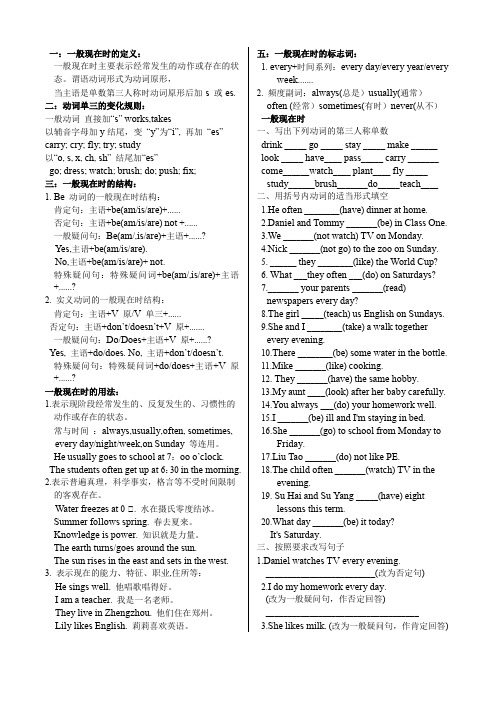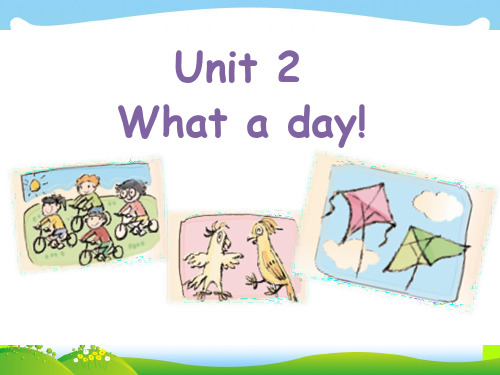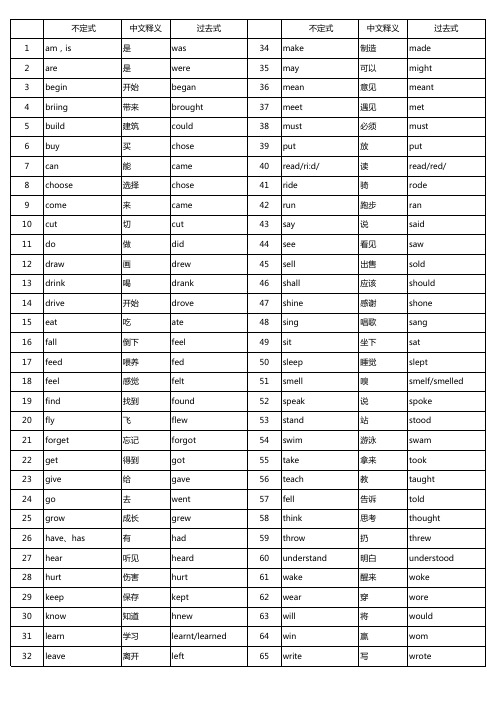六年级英语过去式ppt课件
苏教牛津版小学英语六上《Unitunit1Theking-snewcloths》PPT课件

三易教育辅导讲义名词child [tʃaɪld] 孩子sentence [ˈsɛntəns]句子mountain[ˈmaʊntən]大山forest [ˈfɔrɪst]森林turn [tɚn]时机prince[prɪns]||王子princess[ˈprɪnsɪs]公主cowboy [ˈkaʊˌbɔɪ] 牛仔jean [dʒin] 牛仔裤kilt [kɪlt] 苏格兰褶裙副词hard[hɑː(r)d]努力地,费力地介词through[θru]穿过其他Miss [mɪs]小姐Mrs ['mɪsɪz] 夫人二、词组long long ago 很久很久以前turn into 变成make new clothes for you 为你做新衣try on 试穿walk through 穿行,步行穿过look after 照顾walk by 经过,路过look at 注视,看in his new clothes 穿着新衣服point at 指着wear clothes 穿衣服shout at 对……大吼in front of在……前面laugh at 对……大笑a lot of people 很多人think hard 努力思考a little boy 小男孩live in 居住在……tell a story 讲故事live with 与……一起生活On the mountain 在大山上in the street 在街道上be happy/sick 开心/生病三、语法(一)过去时态Long long ago,there was a king.He liked new clothes.很久很久以前,有一个国||王,他喜欢新衣服.There were a lot of people in the street.街道上有许多人.1、概念一般过去时,表示过去某个时间里发生的非持续性动作或存在的状态、习惯、事物,也表示过去经常或反复发生的动作,格言本来用过去时者不可改变其时态.2、一般过去时的用法:1.过去发生的动作.例如:The police stopped me on my way home last night.We worked Did we work? We did not work Did we not work? You worked Did you work? You did not work Did you not work?They worked Did they work? They did notworkDid they not work?4、动词原型变为过去式(二)特殊句式1、Show sb. sth. =show sth. to sb.向某人展示某事物The two men showed the king his new clothes.=2、Tell sb.sth. =tell sth. to sb.告诉某人某事The old man told the boy a story.=3、Give sb.sth. =give sth. to sb.给某人某物You picked a flower. Now give me your child.=4.sb . have to do sth.不得不做某事We have to start the story again.四、音标‘ar ,发音[a:]课本:arm ,card , hard ,park ,party补充:car , cartoon ,far ,farm ,star ,jar,garden,yard三、课后作业一、单词辨音,判断读音是否相同,相同的打"√ 〞,不同的打"×〞1.long point ( ) 2. laugh afternoon ( )3. arm art ( )4. start hard ( )5. flower show ( )6. shout house ( )五、教师评定:1、学生上次作业评价:○好○较好○一般○差2、学生本次上课情况评价:○好○较好○一般○差教师签字:家长签字:___________三易教育教务处。
小学六年级英语复习——过去式

The little boy jumped up and down in the park.(小男孩在公园里跳上跳下。)
walk的过去式是walked,例句
We walked to school instead of taking the bus.(我们步行去学校,没有坐公交车。)
过去进行时
表示在过去某一时刻正在进行的动作或状态。如“We were playing football at that time”(那时我们正在踢足球)中的“were playing”就是过去进行时。
过去完成时
表示在过去某一时间之前已经完成的动作或状态。如“They had finished their homework”(他们已经完成了作业)中的“had finished”就是过去完成时。
行为类动词过去式及例句
listen的过去式是 listen…
I listened to the radio while I was driving.(我开车时听广播。)
read的过去式是read ,例句
He read a book about science last week.(上周他读了一本关于科学的 书。)
一般过去时
表示过去某个时间发生的动作或状 态
过去进行时
表示过去某个时间正在进行的动作 或状态
过去完成时
表示过去某个时间之前已经完成的 动作或状态
过去完成进行时
表示过去某个时间之前一直在进行 的动作或状态
05
小学六年级常见过去式及例句
吃喝类动词过去式及例句
eat的过去式…
I ate a big dinner yesterday.( 我昨天吃了一顿丰盛的晚餐。)
六年级下册英语第六模块的课文每个的过去式

一:一般现在时的定义:一般现在时主要表示经常发生的动作或存在的状态。
谓语动词形式为动词原形,当主语是单数第三人称时动词原形后加-s或-es.二:动词单三的变化规则:一般动词直接加“s” works,takes以辅音字母加y结尾,变“y”为“i”, 再加“es” carry; cry; fly; try; study以“o, s, x, ch, sh” 结尾加“es”go; dress; watch; brush; do; push; fix;三:一般现在时的结构:1. Be动词的一般现在时结构:肯定句:主语+be(am/is/are)+......否定句:主语+be(am/is/are) not +......一般疑问句:Be(am/,is/are)+主语+......?Yes,主语+be(am/is/are).No,主语+be(am/is/are)+ not.特殊疑问句:特殊疑问词+be(am/,is/are)+主语+......?2. 实义动词的一般现在时结构:肯定句:主语+V原/V单三+......否定句:主语+don’t/doesn’t+V原+.......一般疑问句:Do/Does+主语+V原+......? Yes, 主语+do/does. No, 主语+don’t/doesn’t.特殊疑问句:特殊疑问词+do/does+主语+V原+......?一般现在时的用法:1.表示现阶段经常发生的、反复发生的、习惯性的动作或存在的状态。
常与时间:always,usually,often, sometimes, every day/night/week,on Sunday等连用。
He usually goes to school at 7:oo o’clock. The students often get up at 6:30 in the morning.2.表示普遍真理,科学事实,格言等不受时间限制的客观存在。
新牛津译林苏教版六年级英语上册Unit 2 What a day第二课时优质公开课课件.ppt

Unit 2 What a day! Yang Ling’s diary:
Try to recite Yang Ling’s diary!
Unit 2 What a day!
Magic cards
• 13、志不立,天下无可成之事。2020/8/142020/8/142020/8/142020/8/148/14/2020
• 14、Thank you very much for taking me with you on that splendid outing to London. It was the first time that I had seen the Tower or any of the other famous sights. If I'd gone alone, I couldn't have seen nearly as much, because I wouldn't have known my way about.
Unit 2 What a day!
It was … I … in the …
Unit 2 What a day!
It was … I … in the …
Unit 2 What a day!
It was … I … in the …
Unit 2 What a day!
It was … I … in the …
1. 今天上午天气晴朗。 It was sunny in the morning.
2. 天空中有许多乌云。 There are a lot of black clouds in the sky.
译林版六年级上册英语全册课件

F: Long long ago, there was a mountain.
反应快
Sam is quick.
S: There was a house on the mountain. F: Great, Sam!
Willy says the next sentence. W: An old man and a little boy lived in the house. F: Wonderful, Willy!
happy
The king
liked new clothes
.
They
looked at the king
and
shouted .
A little boy pointed at the king and laughed .
1
Long long ago, there was a king. He liked new clothes. One day, two men visited the king. “My king, we can make new clothes
译林版六年级上册
英 语
全册优质课件
学习目标:
1.介绍be动词过去式的构成。 2.引入规则动词过去式的构成。 3.会用日常用语。
Where were you yesterday, Mike?
你昨天哪里?
What did you do?
你干了什么?
I was at home.
I watched TV.
showed
clever foolish
?
Miss Fox Sam Willy
Who are they?
小学六年级英语语法总复习PPT课件

• 小学阶段不规则动词全表
• Infinitive Past tense Infinitive
• 1. am, is
was
2. keep
• 3.are
were
5. make made
4.become
7. blow
blew
8. read
• 9. buy
bought
10. ride
• 11. catch caught
fly-flying walk-walking
jump-jumping sleep-sleeping
climb-climbing fight-fighting
swing-swinging drink-drinking catch-catching pick-picking
watch-watching play-playing
dance danced
变y为 i+ed
study studied
动词的过去式(不规则)
go-went read-read eat-ate sing-sang take-took buy-bought see-saw swim-swam am,is-was do-did are-were have-had get-got leave-left fly-flew stop-stopped(双写)
.
• 一般现在时的变化
1. be动词的变化。
否定句:主语+ be + not +其它。 如:He is not a worker.他不是工人 一般疑问句:Be +主语+其它。 如:-Are you a student? -Yes. I am. / No, I‘m not. 特殊疑问句:疑问词+一般疑问句。如:Where is my bike?
人教版六年级英语下册《Where did you go》ppt教学课件

--_______________________________.
( B )2.--Where did you go?
A.I went to the park.
--___________________________.
B. I am going to ride a bike.
A.I go to the park. B. I went to the park. C. I'm going to the park. ( C )3.I ________ a bike last Saturday.
Expand
小红帽
小红帽是一个可爱的女孩。她喜欢红帽子,于是 她妈妈就叫她小红帽。
她的祖母很爱小红帽,但现在她生病了。小红帽 的妈妈非常忙,所以她让小红帽去看望祖母。在森林 里,一只狼看见了小红帽。“瞧啊!小红帽。午餐有 小孩子可以吃啦!这是一条去她祖母家的路。” 狼来 到了祖母家并吃掉了祖母。然后他戴上祖母的眼镜, 并穿上祖母的衣服并睡在祖母的床上。
B.ride B.went
C.did C.was
(A)5.A.fall
B.could C.saw
Exercise
单项选择
( A )1.Where did you_________ last Saturday? ( C)4.--What did you do there?
A. go B.goes C. went
feel hurt 感到不快;
Expressions
Where did you go last Saturday? 你上周六去哪儿了?
由where引导的特殊疑问句,用作疑问副词, 在(往、从)哪里, 在什么地方。 eg: Where are you? 你在哪儿?
小学英语教科版六年级上(第81页)过去式

不定式 33 let
中文释义 让 let
过去式 66 catch
不定式
中文释义 抓住
过去式 caught
中文释义 是 是 开始 带来 建筑 买 能 选择 来 切 做 画 喝 开始 吃 倒下 喂养 感觉 找到 飞 忘记 得到 给 去 成长 有 听见 伤害 保存 知道 学习 离开 was were began
Hale Waihona Puke 过去式 34 35 36 37 38 39 40 41 42 43 44 45 46 47 48 49 50 51 52 53 54 55 56 57 58 59 60 61 62 63 64 65 make may mean meet must put
不定式 1 2 3 4 5 6 7 8 9 10 11 12 13 14 15 16 17 18 19 20 21 22 23 24 25 26 27 28 29 30 31 32 am,is are begin briing build buy can choose come cut do draw drink drive eat fall feed feel find fly forget get give go grow have、has hear hurt keep know learn leave
read/ri:d/ ride run say see sell shall shine sing sit sleep smell speak stand swim take teach fell think throw understand wake wear will win write
read/red/ rode ran said saw sold should shone sang sat slept smelf/smelled spoke stood swam took taught told thought threw understood woke wore would wom wrote
- 1、下载文档前请自行甄别文档内容的完整性,平台不提供额外的编辑、内容补充、找答案等附加服务。
- 2、"仅部分预览"的文档,不可在线预览部分如存在完整性等问题,可反馈申请退款(可完整预览的文档不适用该条件!)。
- 3、如文档侵犯您的权益,请联系客服反馈,我们会尽快为您处理(人工客服工作时间:9:00-18:30)。
He studied English in America in 2012. 注意:元音字母+y结尾,直接加ed. play---played
规则变化:
4.末尾只有一个辅音字母的重读闭音 节词,先双写辅音末尾的辅音字母, 再加ed.
stop---stopped plan---planned
翻译: 他在我面前停了下来。
He stopped in front of me.
不规则变化:
也就是说不能在词尾加ed. 常见不规则动词:
am/is--- was are----were
have/has----had eat----ate
see----saw
buy----boy----said
bring----brought begin----began stand----stood put----put feel----felt break---broke
sit----sat
do---did teach----taught
run---ran
know---knew hear---heard tell---told get---got become---became ride---rode
六年级英语过去式
--Fred
什么叫一般过去时? 用来陈述我们说话之前发生的事 情叫一般过去时。
She went to the hospital this morning. 今天早上她去医院了。
I was ten years old when she left. 她离开时我十岁。
一般过去时要把动词变成过去式。
4. Is_t_a_y_e_d_(stay) at home last weekend.
5. I _d__ra_n_k__(drink) some tea last night.
6.She _w_a_s__(be) six when her mother died.
6.We _h_a_d____(have) a good time last holiday.
变一般疑问句
I went to the zoo last week. Did you go to the zoo last week? I stayed at home last night. Did you stay at home last night? I watched TV yesterday. Did you watch TV yesterday?
写出下列单词的过去式
go----went do--- did is---- was hope---- hoped stay---- stayed
swim----swam run--- ran
wash----washed read--- read visit---- visited clean--- cleaned study---- studiedwatch--- watched live---- lived read--- read feel---- felt sleep--- slept are--- were write-- wrote
翻译: 昨天下午我和朋友一起踢足球。 I played football with my friends yesterday afternoon.
英语句子顺序:
某个人
(主语)
做
(谓语动词)
某一件事
(宾语)
怎么做(方式)
(方式状语)
在哪里
(地点状语)
什么时候
(时间状语)
昨天晚上他在家里认真地做作业。 He did homework carefully at home last night. Last night he did homework carefully at home.
parents last weekend.
5. 两天前我看了一本无聊的书。
I read a boring book two days ago.
用单词正确形式填空 1. What_d_i_d_. (do) you do last night? 2.I __c_le_a_n_e_d_(clean) my room and _w__at_c_h_e_d_(watch) TV last weekend. 3. How__w_a_s__(be) your weekend?
1.我上个星期就坐这里。
I sat here last week.
2.昨天晚上我在家看电视。
I watched TV at home last night.
3. 上个周末我洗衣服了。
I washed my clothes last weekend.
4. 上个周末他和父母看了一部有趣的电影。
He saw an interesting film with his
规则变化:
2.以不发音的字母e结尾,直接加d
hope---hoped live---lived use---used like---liked
翻译: 五年前我在贵阳和父母住一起。 I lived in Guiyang with my parents five years ago.
规则变化:
3.以辅音字母+y结尾,先变y为i,再加ed. study---studied carry---carried worry---worried
look---looked use---used see---saw
时间用过去时间。 last night/year/month/week… Three years ago; two weeks ago…
2013/2009/1999/2014…
动词过去式变化:
规则变化:
1. 直接在末尾加 ed
stay---stayed wash---washed clean---cleaned watch---watched
catch----caught go---went
write----wrote drive----drove drink----drank
sleep---slept sweep---swept pay---paid
give----gave
come----came take----took
swim----swam
